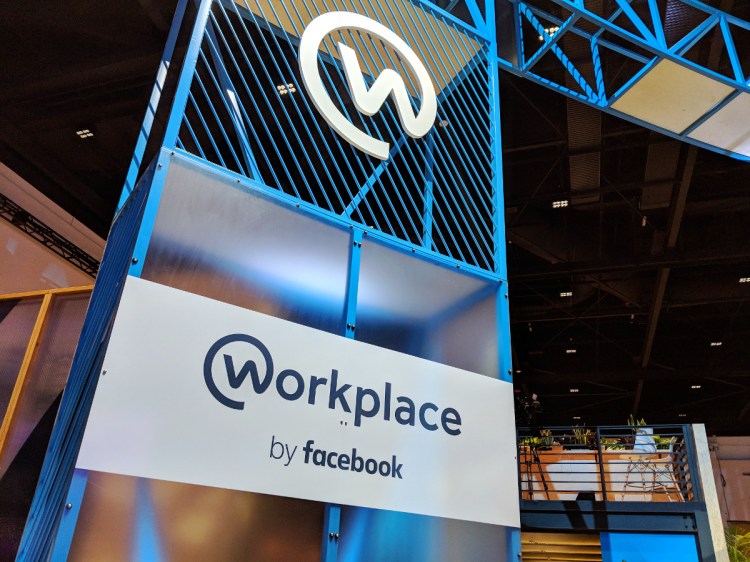Facebook today announced that its Workplace by Facebook and messaging app Work Chat will now support conversations across companies for chat, voice calls, and video calls with up to 50 people. Work Chat is the chat client for Workplace by Facebook, an enterprise team communications tool that functions a lot like Facebook but is made for internal company use.
Multi-company calls and chat follow the introduction of multi-company groups in 2016, one of the first major upgrades for Workplace.
Work Chat also got a series of updates today, including the ability to set do not disturb hours, pin messages to the top of the Work Chat screen, or reply directly to specific messages. Workplace is already able to do things like one-on-one video calls and Facebook Live for companywide livestreams.
The Workplace news comes a day after Facebook introduced Portal and Portal+, two devices built by Facebook for Messenger video calls with Amazon’s Alexa inside.
June 5th: The AI Audit in NYC
Join us next week in NYC to engage with top executive leaders, delving into strategies for auditing AI models to ensure fairness, optimal performance, and ethical compliance across diverse organizations. Secure your attendance for this exclusive invite-only event.
At launch, Portal devices are focused on consumers and will not support Workplace, Facebook VP Julien Codorniou told VentureBeat in a phone interview, though it’s easy to imagine how it could work with Work Chat, an app designed to be the enterprise equivalent of Facebook Messenger.
Alongside the ability to pin messages in a group chat, group administrators can now mark Workplace posts as important to pin them to the top of the Workplace News Feed.
Changes are being made to the Work Graph algorithm to surface more relevant content for employees.
“We had to build for Workplace choosing a very different algorithm because the message from your manager is more important than the post from the intern in Japan, so we’ve been adapting all the machine learning equipment from Facebook to Workplace to make sure that you never miss something that is important for you,” Codorniou said.
Also announced today: Global availability for Safety Check will happen in January.
Derived from Facebook’s Safety Check, the Workplace version can be used by large multinational companies to ask employees about their well-being in the wake of a serious accident, natural disaster, or other major incident that threatened their lives.
Safety Check for Workplace is currently used internally at Facebook and by a limited group of beta customers such as Delta Airlines, who recently used Safety Check to check on employees during Hurricane Florence and a typhoon that hit Hokkaido, Japan.
“Showing them [employees] that you care about them can make a real difference,” Codorniou said.
Workplace is currently used by 30,000 companies, a figure first shared by Facebook in May. By comparison, competitor Slack has 70,000 paid team users and Microsoft Teams is used by 329,000 organizations, up from 200,000 earlier this year.
Facebook continues to call Workplace different from rivals in that it replicates the recognizable Facebook UI for entire companies to use, not just a handful of teams.
New Workplace user companies announced today include GSK, which has 161,000 employees, and Securitas, which has 300,000 employees, as well as Vodafone, Telefonica, and Chevron.
The news was shared today at Flow, Workplace’s first-ever annual conference.
Ahead of the conference, Codorniou reflected on the mistakes that were made in the initial rollout of Workplace in fall 2016.
“The go-to-market strategy we had I don’t think was a perfect one, but I think this is what it takes to make something new within a company like Facebook. As you know, at Facebook we are great failers, and we love to fail because we learn from that. And with Work, which is new for us, we’ve done a lot of mistakes, but we’ve learned a lot along the way, which I think explains the passion we see,” he said.
“You don’t sign companies like GSK, Starbucks, or Walmart if you don’t have a good product or go-to-market strategy, but it took us some time to understand exactly how to build a SaaS startup within the Facebook company.”
In other recent Workplace developments, the service was made free for all educators and nonprofit organizations, and in May it added support for more than 50 SaaS apps, including HubSpot, BlueJeans, Smartsheet, ServiceNow, and Jira from Atlassian.


